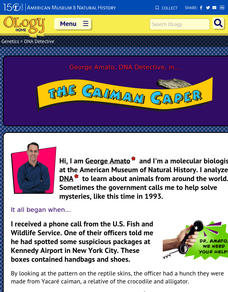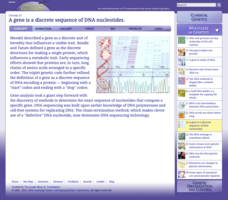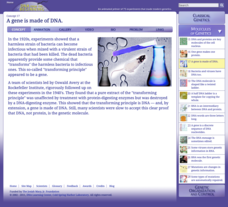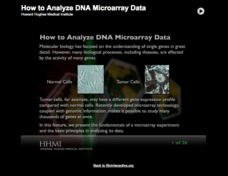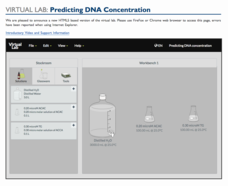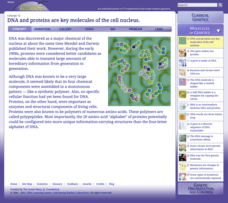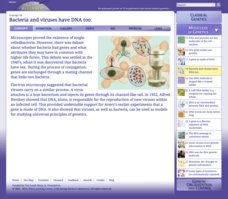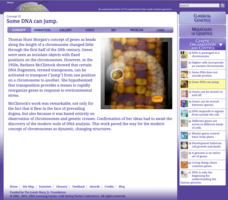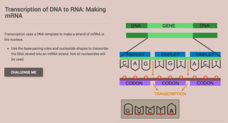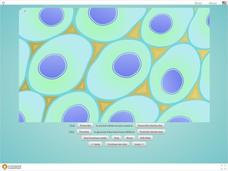American Museum of Natural History
DNA Detective
Match up the DNA code. Pupils read the website from the American Museum of Natural History about how DNA can determine whether a skin is from a particular type of reptile. Using the same technique, learners match up products with the...
Concord Consortium
DNA: The Double Helix
Picture a double helix as a twisted ladder. Scholars see this image through a simulation that allows young scientists to observe a small fragment of DNA in many different formats. They compare the models, colors, bonds, and strands as...
American Museum of Natural History
DNA Detective
DNA is like the fingerprint of genetics. A quick lesson introduces the topic of DNA sequences with a mystery about an endangered species. The lesson shows how DNA extraction, replication, and sequencing often provide undeniable evidence...
Cold Spring Harbor Laboratory
A Gene Is a Discrete Sequence of DNA Nucleotides
Frederick Sanger won two Nobel prizes for protein sequencing and DNA sequencing. Young scientists learn about Dr. Sanger's research and amazing discoveries. They read an article and a biography, view videos and animations, and apply...
Cold Spring Harbor Laboratory
A Gene Is Made of DNA
Does a protein or DNA store genetic instructions for life? Follow the research from the 1920's experiments on mice through the 1940's experiments on bacteria to learn the answer to the difficult question. Scholars use an online...
Chemistry Collective
Virtual Lab: DNA Binding Problem
Why do the bases in DNA pair up the way they do? Unravel the mystery of the double helix in a virtual lab. Young scientists follow in the footsteps of Watson and Crick to determine the free energy associated with DNA base pair binding....
Chemistry Collective
Virtual Lab: Unknown Concentration of DNA Solution Problem
Highlight DNA solution with fluorescent dyes! Scholars use dye to determine the concentration of a DNA solution. As the dyes bind with the DNA solution, learners make conclusions about the limiting reactants.
Howard Hughes Medical Institute
How to Analyze DNA Microarray Data
Unravel the complexities of DNA research. Analyzing DNA data can be a daunting, time-consuming task; however, as the lesson explains, an interactive importance of the research outweighs its complexities. The presentation breaks down the...
Chemistry Collective
Virtual Lab: Predicting DNA Concentration
Play a little game of concentration! A virtual lab investigation allows learners to predict the products and reactants of a DNA reaction. They make their calculations and then test their predictions in the lab workbench.
Howard Hughes Medical Institute
Niche Partitioning and DNA Metabarcoding
What is DNA metabarcoding? Show your biology class the latest method for studying biodiversity in an ecosystem with a fun, informative interactive. Individuals examine the animal species that compete for vegetation, then learn how their...
Cold Spring Harbor Laboratory
A Half DNA Ladder Is a Template for Copying the Whole
The experiment known as one of the most beautiful experiments in biology changed the way we think about DNA. Learn about the experiment and the scientists who designed it—as well as the scientists who built on the results—with an online...
Cold Spring Harbor Laboratory
The DNA Molecule Is Shaped like a Twisted Ladder
One of the first models of DNA appeared to be a triple helix. Young scientists learn about the many scientists who worked to find the shape of DNA. They observe multiple models, tests, and experiments to understand the conclusions. An...
Cold Spring Harbor Laboratory
DNA and Proteins Are Key Molecules of the Cell Nucleus
When DNA research first began, it required almost an entire day to extract the molecules from a cell nucleus. Now it requires less than an hour. Scholars learn about the early theories of DNA with an online interactive, videos,...
Cold Spring Harbor Laboratory
RNA Is an Intermediary Between DNA and Protein
For years, scientists believed tRNA was junk left over from larger RNA. Three scientists used different approaches to prove tRNA actually exists as the connection between DNA and protein. Learn about their experiments, their lives, and...
Cold Spring Harbor Laboratory
Bacteria and Viruses Have DNA Too
In the 1940s, scientists discovered bacteria conjugation, the process of DNA transfer or bacterial sex. The discovery proved that bacteria and viruses contain DNA and led to a Nobel prize. Interested individuals learn about the...
Cold Spring Harbor Laboratory
DNA Words Are Three Letters Long
DNA writes 64 different words but only codes for 20 different amino acids. Budding scientists learn about where each of these numbers come from and why they aren't equal with an online interactive. The resource explains the research, the...
Cold Spring Harbor Laboratory
Some DNA Can Jump
Some people have a natural ability to jump, but did you know DNA also naturally jumps? Learn about the fun habit by looking at the research of a pioneering female scientist. Barbara McClintock fought prejudice and surpassed her mentors...
Chemistry Collective
Virtual Lab: DNA - Dye Binding: Equilibrium and Buffer Solutions
Your class is bound to be fascinated by this virtual lab! Young biochemists explore molecules that bind to specific sites on the DNA molecule through a skillful simulation. The lesson challenges learners to create a DNA-bound solution...
Howard Hughes Medical Institute
DNA Sequence Assembly
Oncologists use DNA sequence data to identify specific cancers and offer more targeted treatments. Grasp an understanding of the complexity involved by learning how the body sequences and assembles DNA. Eager scientists explore the...
Howard Hughes Medical Institute
Creating Phylogenetic Trees from DNA Sequences
How closely are animals related? Check their phylogenetic trees! The use of DNA sequencing altered our understanding of these relationships. Individuals explore and gain a better understanding of how scientists sort, align, and determine...
CK-12 Foundation
Transcription of DNA to RNA: Making mRNA
Transcription means a written copy but how can DNA write a message? The video explains transcription and translation as they relate to DNA and RNA. Then in the interactive, scholars practice base pairing and answer analysis...
Concord Consortium
DNA to Protein
Starting from a view of cells, a constructive simulation shows every step of building a new protein. It walks through transcription, translation, building amino acids, and folding the protein. Viewers control if it plays as a video or...
Cold Spring Harbor Laboratory
Some DNA Does Not Encode Protein
Roy John Britten easily earned a PhD in nuclear physics—but he found painting with water colors too difficult. Young scientists learn about Britten's life, career, and research with an online interactive. They read a biography, view...
Cold Spring Harbor Laboratory
DNA Is Packaged in a Chromosome
Roger Kornberg, the oldest son of two biochemists, won the 2006 Nobel Prize in Chemistry. Learn about Kornberg and his scientific research with an animation, videos, biography, and an applied problem-solving activity. A summary and...
Other popular searches
- Dna Replication
- Dna Structure
- Dna Fingerprinting
- Dna Models
- Dna Replication Worksheet
- Dna Sequencing
- Dna Extraction
- Dna Technology
- Recombinant Dna
- Dna Mutations
- Dna Structure Worksheet
- Mitochondrial Dna
